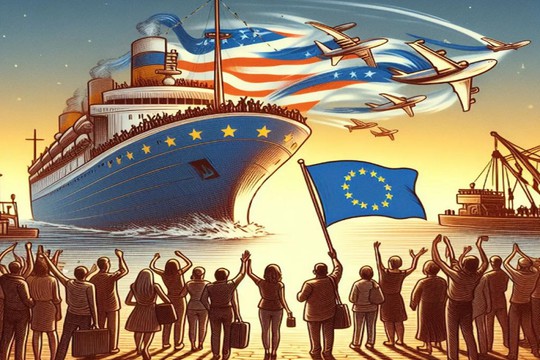Europe must prepare for a post-American world.
Pic.: davekeating.substack
It’s time for Washington to ‘Europeanize’ NATO and give up responsibility for the continent’s security, writes ‘Foreign Affairs’.
A debate about the U.S. role in Europe is long overdue, but both sides have wrongly defined the issues and interests at play. In fact, the United States has the same cardinal interest in Europe today that it has had since at least the early 1900s: keeping the continent’s economic and military power divided. In practice, pursuing this goal has meant preventing the emergence of a European hegemon. Unlike the continent in the mid-twentieth century, however, Europe today lacks a candidate for hegemony and, thanks in part to the success of U.S. efforts after 1945 to rebuild and restore prosperity to Western Europe, another hegemonic threat is unlikely to emerge.
The United States should recognize that it has achieved its main goal in Europe. Having successfully ensured that no country can dominate the continent, it should embrace a new approach to the region. Under a revised strategy, the United States would reduce its military presence on the continent, Europeanize NATO, and hand principal responsibility for European security back to its rightful owners: the Europeans.
Russia, meanwhile, lacks the resources and opportunity to mount a hegemonic challenge. With a population of 143 million people, compared with the European NATO countries’ roughly 600 million. The European members of NATO have an economy roughly ten times bigger and significantly more developed than Russia’s. Even the most pessimistic estimates available show that European countries spent significantly more on defense than Russia even before the costly invasion of Ukraine and before the resulting increases in European defense spending. According to the International Institute of Strategic Studies, Russia spent roughly $75 billion in 2023, whereas NATO’s European members together spent over $374 billion.
With no candidate for European hegemony lurking, there is no longer any need for the United States to take the dominant role in the region. Without Washington at the helm, Europe today would have normal international politics—which, admittedly, includes the prospect of some interstate conflict at the periphery — without opening the door to a hegemonic challenge.
Amid growing demands at home and in Asia, a course correction is in order. The idea would not be to isolate the United States from Europe but to shift the U.S. role from provider of first resort to balancer of last resort.
First, the United States should start withdrawing some of its troops from Europe, forcing the responsibility for providing the conventional forces needed to secure Europe back onto European shoulders. Right now, the United States has roughly 100,000 troops stationed on the continent, with the largest concentration in Germany. A good place to start the drawdown would be with the 20,000 additional troops deployed by the Biden administration in 2022 after the Russian invasion of Ukraine. Once those troops are pulled out, Washington should signal its intent to resume the withdrawal of 12,000 troops from Germany, a plan that Trump approved and Biden froze. Two structured rounds of withdrawal would drive the point home: Europe’s most powerful countries need to step up. Eventually, the additional U.S. forces and equipment in Europe could be progressively drawn down, shifting the burden of Europe’s conventional deterrence needs to Europeans.
Making these moves now would take advantage of Europeans’ evident willingness to do more for their own defense…
Second, to facilitate the creation of more European military power, the United States should drop some of its long-standing demands on how Europe arms itself. Rather than urge European states to buy American and avoid duplication, Washington should encourage European states to invest in their own defense-industrial base.
Finally, the United States should gradually transform NATO into a European-run and -led alliance. To start, Washington should encourage the European members of the alliance to create a “European pillar” within NATO—a vehicle for members of the alliance to work out common positions on defense and security matters without American input. The U.S. president should make clear that the next supreme Allied commander will be a European, breaking with a 75-year practice in which an American has always held the post. And the United States should reduce the depth of its engagement in NATO committees, deferring to allies, for example, in policy debates within the Deputies or Defense Policy and Planning Committees, where consensus on security, political, and organizational matters is shaped.
All these steps would make clear that the United States expects the Europeans to manage the alliance on a day-to-day basis. They will be well positioned to do that: NATO’s considerable bureaucratic infrastructure makes it possible to build on habits of cooperation acquired over the alliance’s long life. U.S. policy does not need to aim at formal withdrawal from or continued membership in NATO; it simply needs to make clear that Washington’s tenure as Europe’s pacifier is coming to an end, and if European defense planners feel that leaves a hole to fill, they must fill it themselves.
In effect, the United States would return the transatlantic relationship to its roots. As an offshore power, Washington would help keep the balance but not seek to dominate the continent itself.
Today, calls for the United States to cling to leadership in Europe ignore the opportunity and direct costs involved and Washington’s increasingly important interests elsewhere. The United States is staring down $35 trillion in debt, a $1.5 trillion annual budget deficit, a growing challenge in Asia, and pronounced political cleavages that make solving these challenges more difficult.
With no indication that the fiscal picture will improve or evidence that domestic pressures are abating, policymakers need to reassess the United States’ foreign obligations, ‘Foreign Affairs’ stresses.
read more in our Telegram-channel https://t.me/The_International_Affairs

 12:20 15.08.2024 •
12:20 15.08.2024 •























